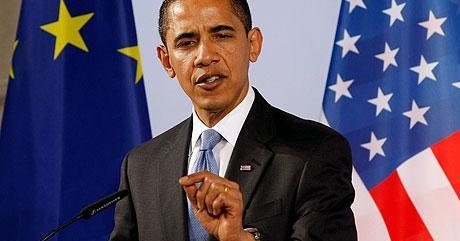Also Americans as well as Europeans were expecting that the EU could finally have a, meaning ONE, face to represent its stances in the international arena, thanks to its new President and “foreign minister”. However less than one month was sufficient to see those hopes vanishing or at least to be postponed for another while.
It will take in fact some time before the EU manages to think strategically and at the moment it still struggles in understanding what it means being a strategic partner, in this occasion for the US. Many sources tell us that at the end of the last EU-US summit in Prague in 2009, the US were very disappointed by the lack of content of the discussions. This by itself made the foundation for a new summit this year shaky. However the Obama administration has kept calling for a stronger transatlantic partnership and very recently, on January 30th in France the Secretary of States Hillary Clinton underlined that: “A strong Europe is critical to our security and our prosperity”.
Unfortunately as we have all found out on Monday (January 1st) Obama has finally decided that he will not take part in the EU-US summit. According to the Wall Street Journal, U.S. officials claimed that the reasons were the uncertainties over the location and on who should represent the EU especially in light of the new institutional framework. On the other hand in the previous days, voices were telling that Obama would prefer to meet with EC President Barroso and European Council President Van Rompuy, nonetheless the Spanish Presidency stuck firm in its decision of holding the summit in Madrid.
The EU once again, has not been able to show its consistency and relevance.
This is very unfortunate. The EU once again, has not been able to show its consistency and relevance, while the interests of one Member State have made lose credibility to the Union as a whole. However we can difficulty disagree with Obama’s decision: he has several challenges in front of him both domestically and internationally which are more relevant to his administration than fixing our institutional confusion and internal conflicts. Sure thing is that Obama might wish to have stronger allies especially as China is getting more assertive as we have seen lately over US decision to sell arms to Taiwan or to meet with the Dalai Lama.
However this could not be it. The Spanish Presidency seems to be keen to make another Transatlantic-gaffe and in the voice of its Spanish Foreign Minister Miguel Angel Moratinos claimed on January 26th that France had been one of the main supporters of lifting the embargo and “Spain is following that line”. It comes without saying that the US would not appreciate that move as they did not about 5 years ago in the latest attempt to lift an arms embargo imposed against China since Tien an Men.
If a positive note can be drawn from this umpteenth EU disappointment is that hopefully this will teach European leaders that the EU structure should stop being the issue at stake in international discussions and instead become a credible player because, as they say in Italy, “dirty clothes are washed at home”. Also in the EU we should stop expecting our partners to struggle understanding how the EU works, especially in light of the fact that many of our leaders still have a blurred idea of it. Demanding so would be “asking for the moon”, which during a global economic crisis is beyond reach even for the US.


1. On 10 February 2010 at 18:38, by Giorgos Replying to: Obama to skip the EU summit: “there is confusion over the summit” US officials say
Replying to: Obama to skip the EU summit: “there is confusion over the summit” US officials say
Well it seems that Obama’s concerns over who to meet are not completely unfounded. However, the US do not seem to care about such institutional arrangements when they ask for more money and fresh troops for the military campaigns (and they will come asking soon...)!
2. On 11 February 2010 at 17:55, by Pietro Replying to: Obama to skip the EU summit: “there is confusion over the summit” US officials say
Replying to: Obama to skip the EU summit: “there is confusion over the summit” US officials say
Thanks for your comment Giorgos!
the issue that you raise is interesting as it allows us to underline the multitude of layers which constitute the EU-US relation.
In particular I would argue that US military support requests are addressed to EU Member States in the framework of NATO and not to the EU as such: in this light EU’s institutional framework is not really relevant in US eyes.
3. On 12 February 2010 at 20:40, by Giorgos Replying to: Obama to skip the EU summit: “there is confusion over the summit” US officials say
Replying to: Obama to skip the EU summit: “there is confusion over the summit” US officials say
Of course what you say its true, institutionally speaking.
However,in a political level, we would be hiding behind our fingers by saying that the EU is a totally differentiated player from its member states (especially in external relations) or that the third countries do not see the French-German “axis” behind this whole construction, the US certainly do. Remember also the talks for the European Army or the EU Taskforce, the US and their allies within the EU wanted and succeeded, to include an explicit provision that this project does not run contrary to NATO
US came to Europe when they asked for freezing assets of alleged terrorists,the asked for full data from Europeans traveling to the US (blocked by the EP)all in the name of the war against terrorism and the do the same with the new SWIFT regulations for bank transactions.
Has suddenly the EU become invisible or irrelevant to them?
For me the US want to pass on the message that they do not want to have the EU as a coordinated and finally reliable player in the international scene. The use the old Kissinger maxim for once again...! OK, maybe I am a bit swift to judge and it is only an issue of time but this is my feeling.My thoughts are a bit oversimplified here but I think you got the idea.
In any case, I agree with the kernel of your article, that is that Europe has a lot of work to do and fight if it really wants not to be sidelined.
Follow the comments: |
|
